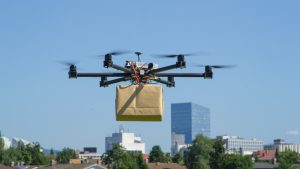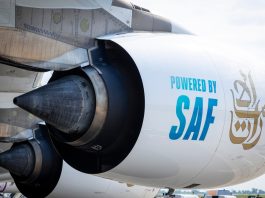The UK is gearing up for a transportation revolution, with flying taxis and large-scale drone services set to become a reality.
In a landmark move, the UK Government has announced over £20m in funding to accelerate the development of next-generation aviation technology.
Announced by the UK Aviation Minister Mike Kane, this funding aims to break down regulatory barriers, enhance public services, and propel the country toward a greener, more efficient future in air mobility.
Minister Kane explained: “I want the UK to have the most advanced aviation technology ecosystem in the world.
“That means creating a nimble regulatory environment and a culture of innovation so everyone can benefit from cutting-edge transport while tackling emissions, traffic, and potentially saving lives.
“Our investment alongside the new Future of Flight industry group will bring together tech experts, drone operators, flying vehicle manufacturers and local communities to identify where change needs to happen.”
Unlocking barriers to innovation
The funding will help streamline regulations, allowing the aviation sector to embrace futuristic solutions like electric vertical take-off and landing (eVTOL) vehicles and autonomous drones.
These advancements could benefit sectors such as healthcare, law enforcement, and infrastructure maintenance.
In a joint announcement, the Aviation Minister and Science Minister detailed how the Department for Transport (DfT), Civil Aviation Authority (CAA), and the new Regulatory Innovation Office (RIO) will work together to modernise regulatory processes.
By cutting red tape, they aim to make it easier for businesses to innovate while maintaining strict safety standards.
Smarter regulations for faster adoption
To ensure the safe integration of drones and flying taxis into UK airspace, authorities are consulting on new electronic conspicuity standards.
These technologies will allow drones and crewed aircraft to share location data electronically, enabling them to coexist safely.
Additionally, the government plans to simplify airspace regulations, shortening the approval timeline for commercial drone operations to just two years.
Emergency services, including firefighters and paramedics, will also benefit from relaxed regulations, allowing them to deploy drones more efficiently in crisis situations.
Moreover, noise exemption rules for drone trials will be adjusted, making it easier to test these technologies in real-world conditions.
Collaborating for a future-ready industry
To guide the transformation of aviation technology, the government is establishing the Future of Flight industry group.
This coalition will bring together regulators, drone operators, and flying vehicle manufacturers to ensure that new aerial solutions align with economic growth and public sector needs.
The government’s Plan for Change also emphasises sustainable aviation, with a focus on lowering emissions through electrification and automation.
The aim is to create a thriving industry while tackling challenges such as air traffic management and urban congestion.
Potential impacts of flying taxis and commercial drones
The integration of flying taxis and commercial drone services has the potential to revolutionise transportation and logistics.
eVTOL air taxis could provide fast, congestion-free travel within cities, reducing commute times dramatically.
Meanwhile, drones can enhance delivery services, transporting medical supplies, groceries, and packages more efficiently than ground-based transport.

In the long term, widespread adoption of these technologies could lead to a multi-billion-pound industry, creating jobs and boosting local economies.
Additionally, the shift to electric-powered aerial vehicles will contribute to the UK’s net-zero targets by reducing reliance on fossil fuel-powered transport.
Stuart Simpson, CEO of Vertical Aerospace, added: “Flying taxis will transform the way we move – making it quicker, quieter and cleaner to travel while connecting communities and supporting essential services.
“The UK has an incredible opportunity to lead the world in this new era of aviation, delivering not just greener transport but real economic growth and skilled jobs.
“This latest funding is another welcome step towards seeing that ambition realised and our world-leading aircraft flying in British skies from 2028.”
Funding allocation and next steps
To bring these advancements to life, the CAA will receive £16.5m in 2025-2026. This funding will support regulatory frameworks for BVLOS (Beyond Visual Line of Sight) drone flights and the integration of eVTOL taxis.
The CAA will also develop roadmaps for piloted flying taxis, introduce drone pathways for businesses, and consult on uncrewed traffic management systems.
An additional £5m will be allocated to the Future Flight Challenge, supporting industry-led demonstrations and commercial drone and air taxi development.
These trials will be essential for proving the safety and viability of this cutting-edge technology before widespread deployment.
The future of urban air mobility
With government backing and streamlined regulations, the UK is poised to become a global leader in advanced air mobility.
By supporting innovative companies and enabling real-world testing, flying taxis and large-scale drone operations could soon transform everyday transport.
As these technologies evolve, they promise not only faster and more efficient travel but also a greener and more connected future.









